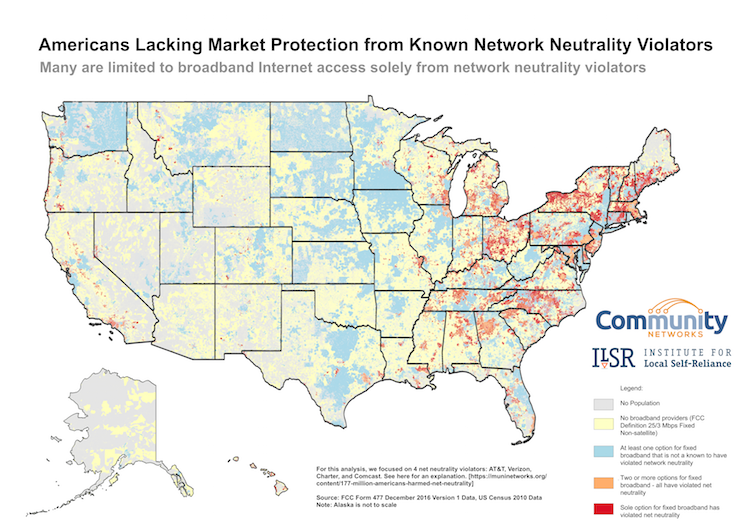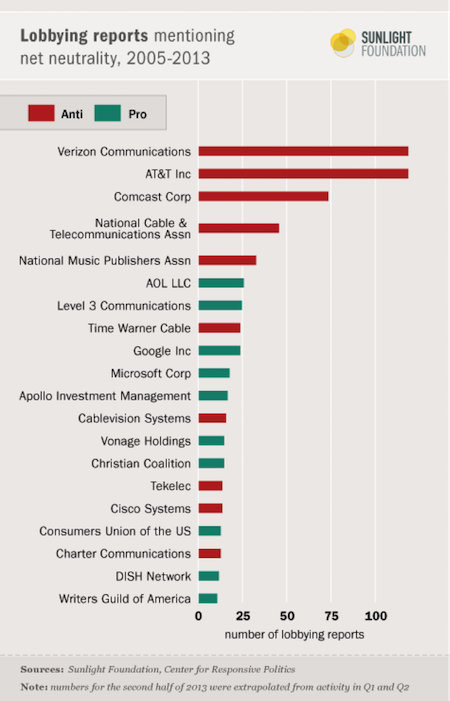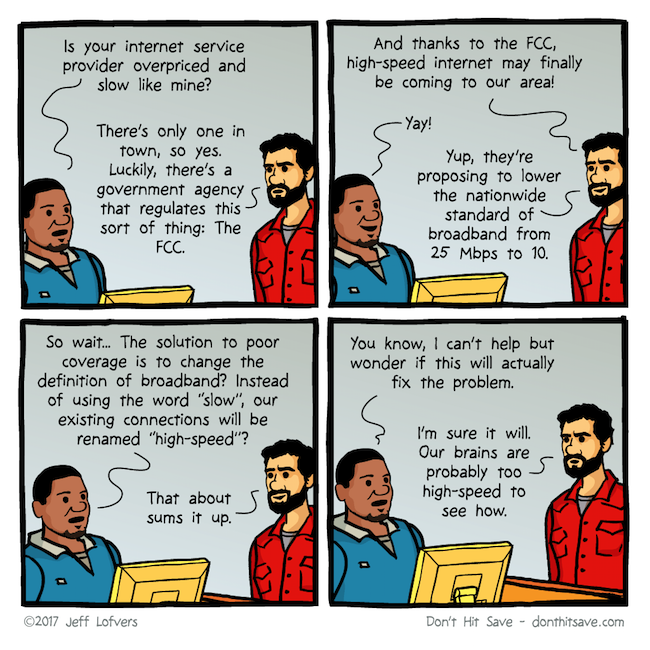
Fast, affordable Internet access for all.

Update 12/20/2017: Original maps generated on December 11th understated the population of Americans forced to obtain services from known network neutrality violators. The problem is even greater than we originally calculated, particularly in New York. End update.
This Thursday, December 14th, the FCC plans to remove network neutrality protections. Republican Commissioners and Chairman Ajit Pai justify the decision by claiming that the market will naturally protect subscribers from predatory big ISP behavior. Unfortunately, the FCC’s own numbers disprove their theory. We dug into the data that reveals how 177 million Americans will be left without any market protection following net neutrality repeal.
Visualizing The Data
Using FCC 477 data, we created a visualization of relevant data. This map focuses on the people and businesses at greatest risk - where they are limited to options from providers that have violated network neutrality in the past or have admitted the plans to violate it in the future.

For a larger image, download this version [18 MB png].
Download Net Neutrality Repeal By The Numbers, U.S.A. Edition, fact sheet here.
The results are not inspiring. More than 129 million people are limited to a single provider for broadband Internet access using the FCC definition of 25 Mbps download and 3 Mbps upload. Out of those 129 million Americans, about 52 million must obtain Internet access from a company that has violated network neutrality protections in the past and continues to undermine the policy today.
The FCC is scheduled to decide the fate of Internet access on Thursday, Dec 14. Will anyone anywhere in the U.S. be able to pay one basic fee to access information on the Internet from the most popular to the most arcane content providers? If all indications are correct, probably not. ISPs will increasingly decide on what terms we access the content we want. Prepare for your bills to go up.
You might wonder why the FCC is so focused on rolling back such an overwhelmingly popular policy in favor of giving more power to the most hated corporations in America. It isn't because the most recent rules to codify the long-standing principle of non-discrimination has harmed investment. It hasn't.
But something struck us about the lobbying campaigns around this issue. This graphic from the Sunlight Foundation shows just how hard the top telecommunications companies and their lobbying associations have focused on defeating network neutrality. The image shows lobbying reports generated by lobbyists and whether or not the entity is opposed (red) or in favor of (green) network neutrality. As you can see, the amount of red coming from the ISPs that serve most of America vastly outstrips the green.

Seeing Red
Since the Sunlight Foundation published this graphic in 2013, the landscape has changed in important ways. The two top firms supporting network neutrality were taken over by big monopolists that oppose maintaining an open Internet.
This is the transcript for Episode 281 of the Community Broadband Bits podcast. Will Rinehart of the American Action Forum in Washington D.C. discusses telecommunications and economics with our host Christopher Mitchell. Listen to this episode here.
Will Rinehart: And I do think that obviously good policy is very very important and that's where you and I agree a lot. You know there's obviously some good policies that can be enacted. There's probably better conversations that could be had in this space and that's also something else that I really do really want to see. You're
Lisa Gonzalez: listening to episode 281 of the Community Broadband Bits podcast from the Institute for Local Self-Reliance. I'm Lisa Gonzales as a research organization. We here at the institute make it a habit to hear all sides of the debate along the way we make connections with people who offer perspectives on policy that differ from ours. We consider these conversations critical as we analyze factors that help us create policy recommendations and resources for local communities. This week Christopher talks with Will Rinehart from the American Action Forum. They got together at the recent broadband community's economic development conference in Atlanta. In this conversation you'll hear the two discuss a variety of topics they talk about the area of telecommunications and economics and the forum's approach. You'll also hear that these different perspectives aren't as black and white as they first appear. Now here's Christopher with Will Rinehart from the American Action Forum.
Christopher Mitchell: Welcome to another edition of the community broadband bits podcasts. I'm Chris Mitchell with the Institute for Local Self-Reliance. Coming to you from Atlanta sitting practically on a runway at the Atlanta airport with Will Rinehart the Director of Technology and Innovation Policy with the American Action Forum. Welcome to the show. Thanks Chris. Thanks for having me. We're at the broadband community's event here. We just had our second panel which is called a blue ribbon panel and general session kind of thing. And you and I are typically brought on as people who have very opposing points of view.

Christopher went to Atlanta for the Broadband Communities Economic Development Conference in early November, and while he was there, he touched base with this week’s guest Will Rinehart. Will is the Director of Technology and Innovation Policy at the American Action Forum, a DC nonprofit organization that’s been around since 2009.
Will and Christopher don’t always see eye to eye on issues that affect telecommunications and broadband policy, but both agree that it’s important to have spirited debate to share perspectives. Only by examining issues from different sides can we craft policy that creates lasting benefits.
In this interview, Will describes his organization and his work there. Chris and Will look at compelling issues such as ISP competition, government regulations, and how the FCC’s 2015 upgraded definition of broadband has reverberated in the market. The two get into franchising and ubiquitous broadband, local authority, and connectivity in rural America. It’s a spirited discussion chock-full of issues.
You can tweet to Will, he’s @WillRinehart on Twitter.
This show is 30 minutes long and can be played on this page or via Apple Podcasts or the tool of your choice using this feed.
Transcript below.
We want your feedback and suggestions for the show-please e-mail us or leave a comment below.
Listen to other episodes here or view all episodes in our index. See other podcasts from the Institute for Local Self-Reliance here.
Thanks to Arne Huseby for the music. The song is Warm Duck Shuffle and is licensed under a Creative Commons Attribution (3.0) license.
The FCC is set to vote on whether or not to repeal network Neutrality under the deceptive guise of “Restoring Internet Freedom” on December 14th. Like others who study broadband and telecommunications policy, we’re distressed by the possibilities for the Internet and its users, should the Commission decide to repeal these protections. Because we use the Internet for so much in our daily lives, reversing network neutrality will give big ISPs like Comcast and Verizon undue power over what information we receive, our online business, and the result may negatively impact innovation.
We’ve gathered together some of our earlier posts on network neutrality to help explain why the policy is so important. In this collection, we’ve included some of our own writings as well as media that we consider paramount to understanding why we need to preserve network neutrality.
The Basics At 80 MPH (Video):
An old but a goody. In this video, Professor Tim Wu explains network neutrality, including paid prioritization. The video is from 2016.
The Big ISP Perspective (Video):
Many of us consider a free an open Internet a necessity to foster innovation and investment, but the words from the lips of the big ISPs are changing, depending on whom they’re talking to. This video reveals what they tell the government about network neutrality versus what they tell investors.
The Small ISP Perspective (Audio):
Like other small ISPs and municipal networks that offer services to the public, Sonic takes the opposite view of Comcast, Verizon, and other big corporate incumbents - they believe network neutrality is important and should be preserved. Dane Jasper, Sonic’s CEO and Co-Founder explains why innovation needs network neutrality in episode 261 of the Community Broadband Bits podcast.
If you live in western North Carolina and struggle with the lack of quality Internet access, the Southwestern Commission — a council of local governments for the region’s seven westernmost counties — in cooperation with the MountainWest Partneship are urging residents to take this survey. Counties in the council include Haywood, Swain, Jackson, Macon, Graham, Cherokee, and Clay.
The goal is to quantify the demand for Internet regionally, focusing on individual counties as opposed to census blocks, in order to better determine accessibility issues. It’s an important process to show Internet providers that there is demand, debunking ISPs claim that rural demand for high-speed Internet doesn't justify the investment. Better data can also establish a foundation for future funding opportunities.
Sarah Thompson, the executive director of the council explained,
It’s really in my opinion one of the most important parts of the process. You’re basically showing [internet service providers] that there is demand, it’s showing even when there is service it’s subpar. In order to move forward with projects, we have to have that data to back up the need. To show that there are opportunities.
FCC’s Inaccurate Data Collection
Through the FCC’s form 477 data collection efforts, the Commission attempted to carry out these crucial first steps in showing aggregate demand and problematic broadband service. The data was compiled into the easily accessible National Broadband Map.
Data is collected from ISPs and it provides information to the FCC based on which census blocks ISPs serve. The problem is that this data exaggerates where coverage is available in rural areas where census blocks can be very large. Areas that may appear on the FCCs maps to be served or to be served with better connectivity are often in reality not served or served with Internet access much slower than FCC mapping indicates. Because state and federal entities typically award grants and loans to communities with the greatest need first, incorrect mapping eliminates rural communities from funding opportunities when they need it the most.
The future of high-quality Internet access in Pinetops, North Carolina, is precarious. Nearby Wilson’s municipal fiber network, Greenlight, provides gigabit connectivity for now, but a series of federal level decisions could change the situation at any moment. Now the story of these two communities and their fight for local telecommunications authority has come to life in the film Do Not Pass Go. Local communities can schedule a screening of the documentary. Watch the trailer below.
A Story Worth Telling
Cullen Hoback’s film tells the story that made national news and that we’ve shared as events unfolded.
Wilson, North Carolina’s municipal Fiber-to-the-Home (FTTH) network has benefitted residents, businesses, and institutions in Wilson since 2008. Neighboring rural towns, including Pinetops, had asked Wilson to expand in order to obtain better Internet access but state law precluded Wilson from serving beyond county borders.
When Chattanooga decided to challenge Tennessee’s law that had a similar effect, Wilson joined the motion to the FCC in 2015. The Commission struck down both laws and Wilson took the opportunity to expand service to Pinetops, the small mountain town of about 1,400 people. Pinetops businesses and residents immediately felt the improvement with FTTH. They experienced economic development opportunities and municipal facilities functioned more efficiently.
This fall, nonprofits and other organizations with an interest in constructive broadband policy have worked to help the new administration’s FCC through the public comment process. We’ve let readers know about opportunities to share their thoughts with the Commission and we’ve submitted comments separately and with other likeminded groups.
Modernizing the Form 477 Data Program
The Commission asked for comments on the method in which it collects data regarding where broadband is accessible. ISPs provide information to the FCC based on which census blocks they serve. We’ve often criticized this approach because it grossly overstates where coverage is available, especially in rural areas where census blocks tend to be large.
Read our ideas for improvements to the Form 477 data collection, which include obtaining more detailed geographic information, minimum and maximum speeds, and pricing information.
Connect America Funding Phase II Bidding Procedures and Program
In order to help bring better connectivity to rural areas, the FCC distributes Connect America Funds (CAF) to entities such as companies and cooperatives to build broadband infrastructure. The process involves bids from these entities. The FCC is considering changes to the current process and bidding procedures, including what types of projects qualify for funding. The Commission asked for comment after proposing a long list of possible changes.
We recently spoke with Jon Chambers of Connexon, who provided more detail about the program and offered his thoughts on CAF and the possible changes.
Read our Reply Comments, that address issues we feel need attention, including the Carrier of Last Resort guarantee, more opportunities for rural cooperatives, and our concern that the FCC will attempt to equate subpar satellite and mobile broadband with high-quality connectivity. We filed our Reply Comments with Public Knowledge, Appalshop, and a long list of other organizations concerned about Internet access in rural America.
In Detroit, AT&T is facing a formal FCC complaint accusing the telecom giant of deploying discriminatory “digital redlining” tactics. This is the second such complaint filed against the telecommunications giant since the first of the year.
Demanding Equality in Connectivity
The complaint filed by civil rights attorney Daryl Parks says the FCC violated the Communications Act which forbids unjust and unreasonable discrimination. A month earlier, Parks filed a similar complaint on behalf of three Cleveland residents. In both instances, Parks and community members maintain that AT&T is withholding high-speed Internet from minority neighborhoods that have higher poverty rates.
These complaints fall under Title II of the Communications Act, which contains not only net neutrality rules but important consumer protections regarding discrimination. Title II SEC. 202. [47 U.S.C. 202] (a) clearly specifies:
It shall be unlawful for any common carrier to make any unjust or unreasonable discrimination in charges, practices, classifications, regulations, facilities, or services for or in connection with like communication service, directly or indirectly, by any means or device, or to make or give any undue or unreasonable preference or advantage to any particular person, class of persons, or locality, or to subject any particular person, class of persons, or locality to any undue or unreasonable prejudice or disadvantage.
We can use words to explain the debate around broadband speeds in the hallowed halls of the FCC, or we can let Jeff Lofvers do it with this awesome webcomic. Lofvers, a software developer, artist, and the creative force behind the Don’t Hit Save webcomic recently released this gem.
We know you'll appreciate it, so please take a moment to check out Don’t Hit Save and consider supporting his work.
